Thomas James Richards, Diaries, Transcript Vol. 2 - Part 3
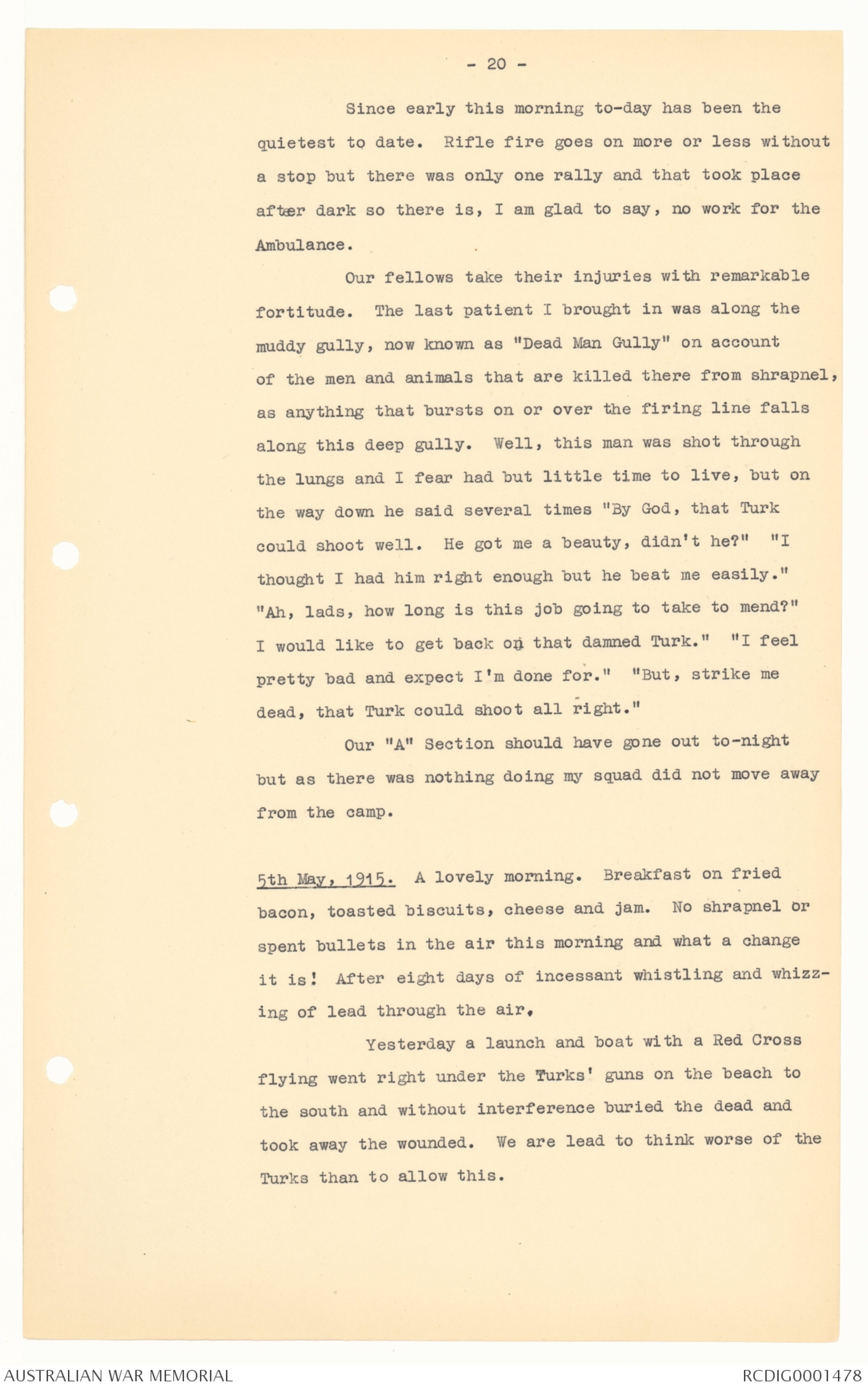
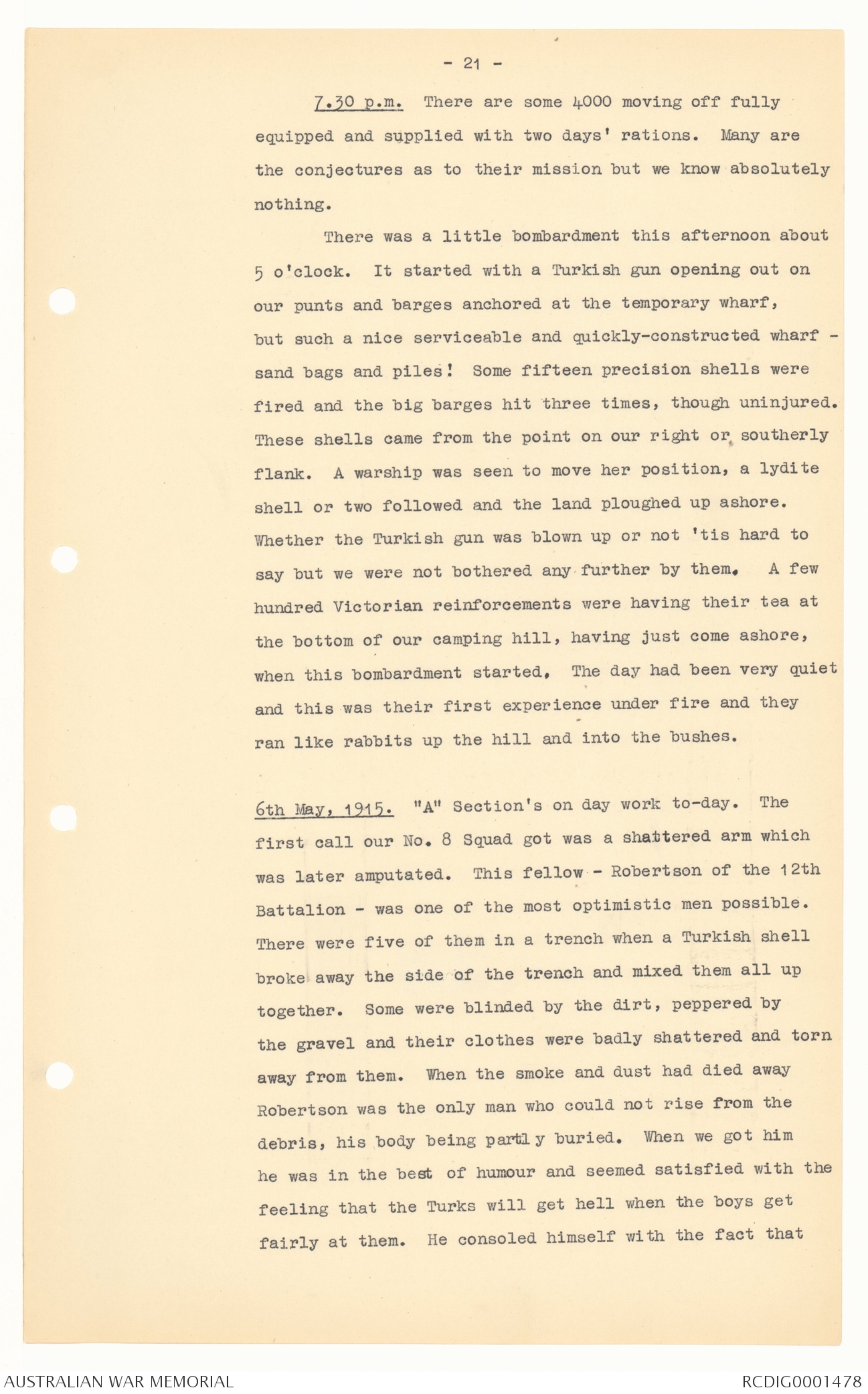
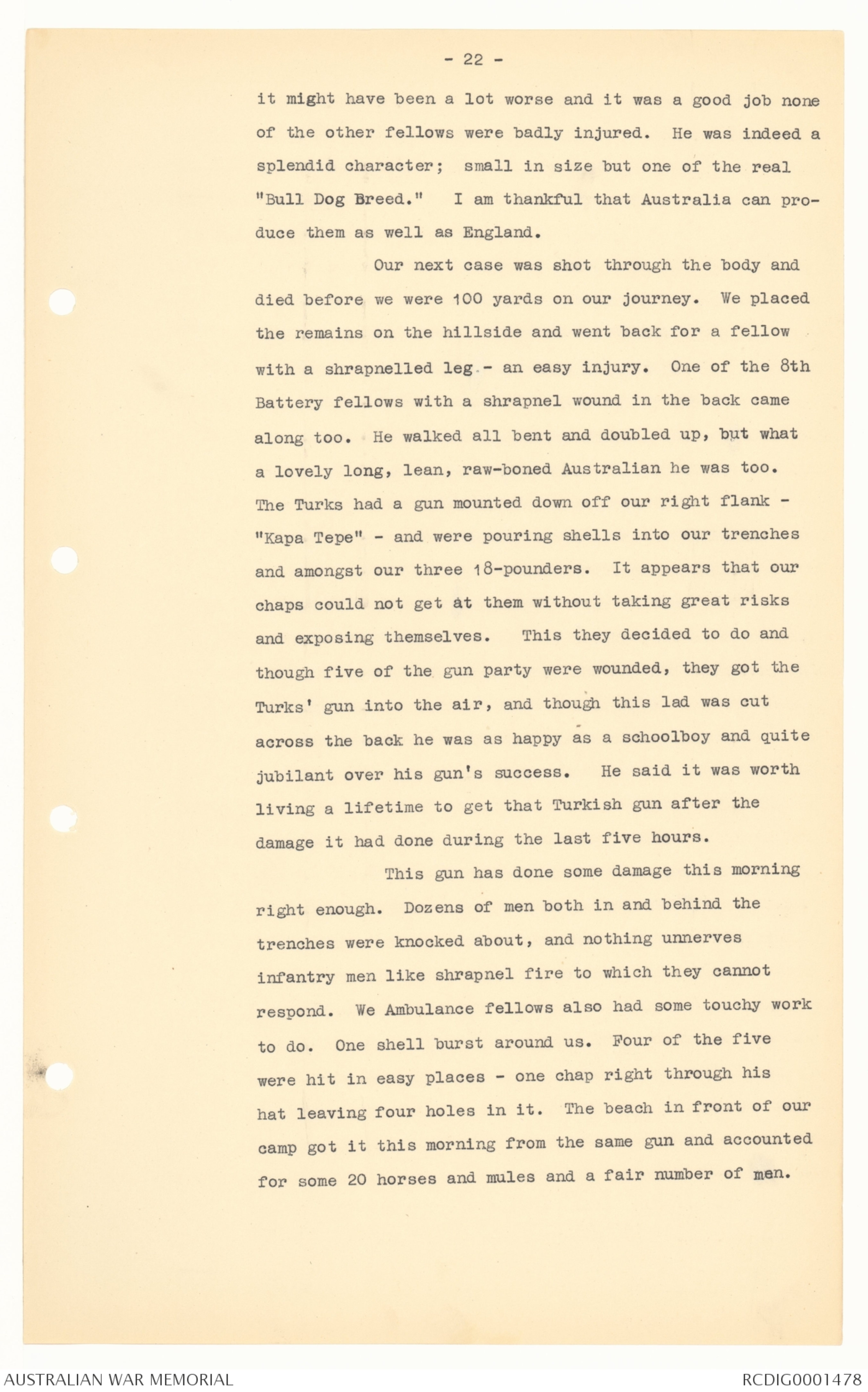
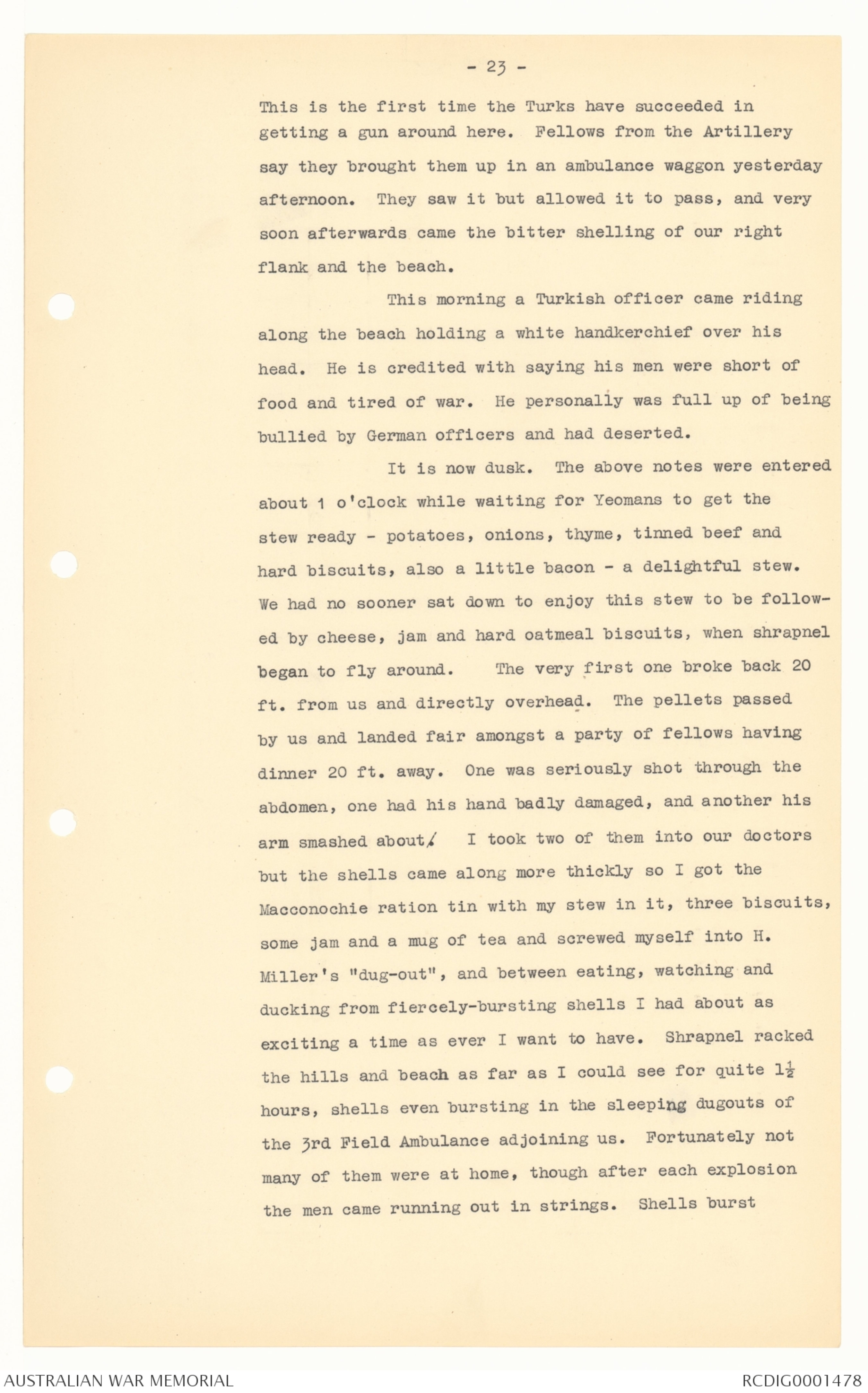
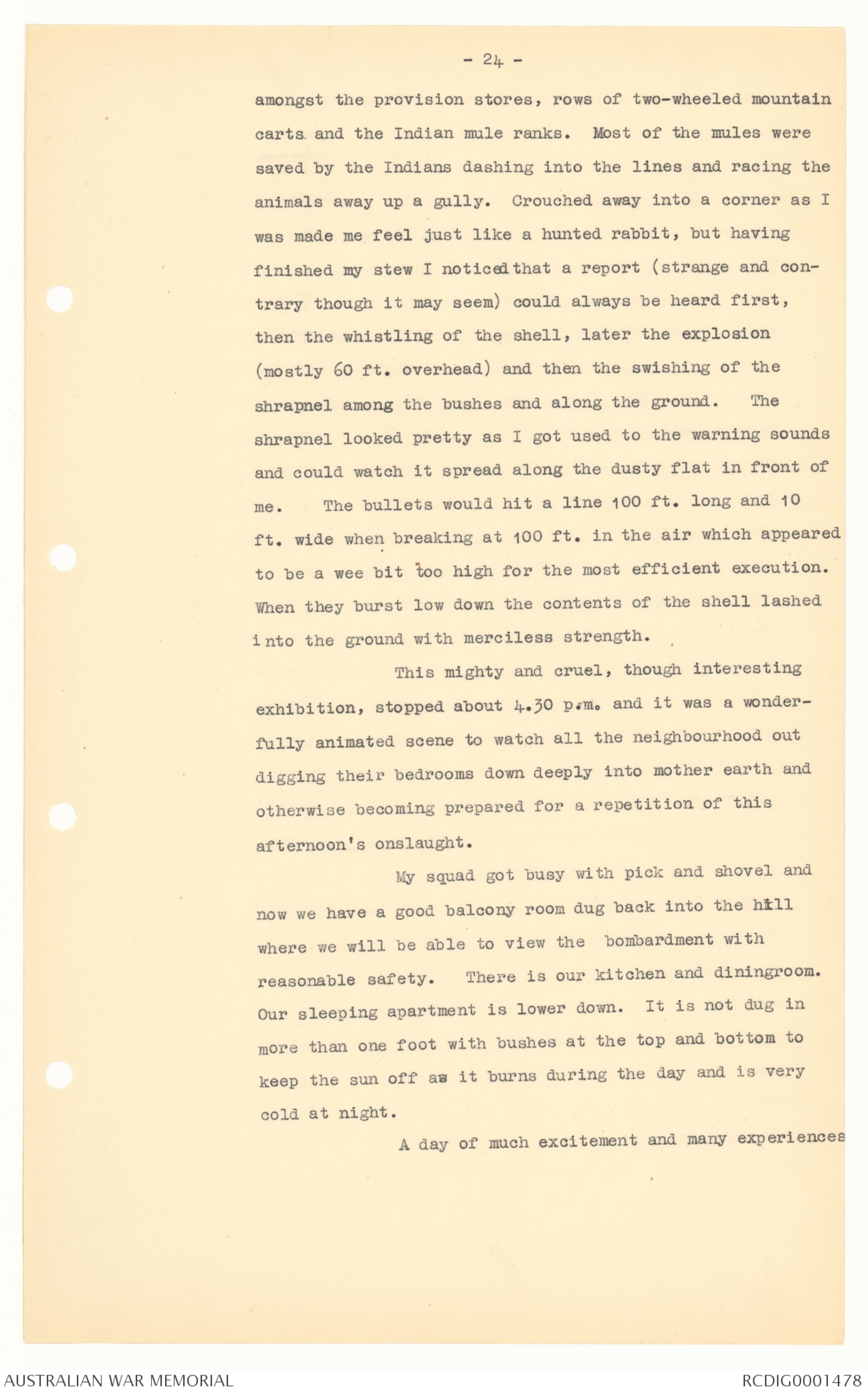
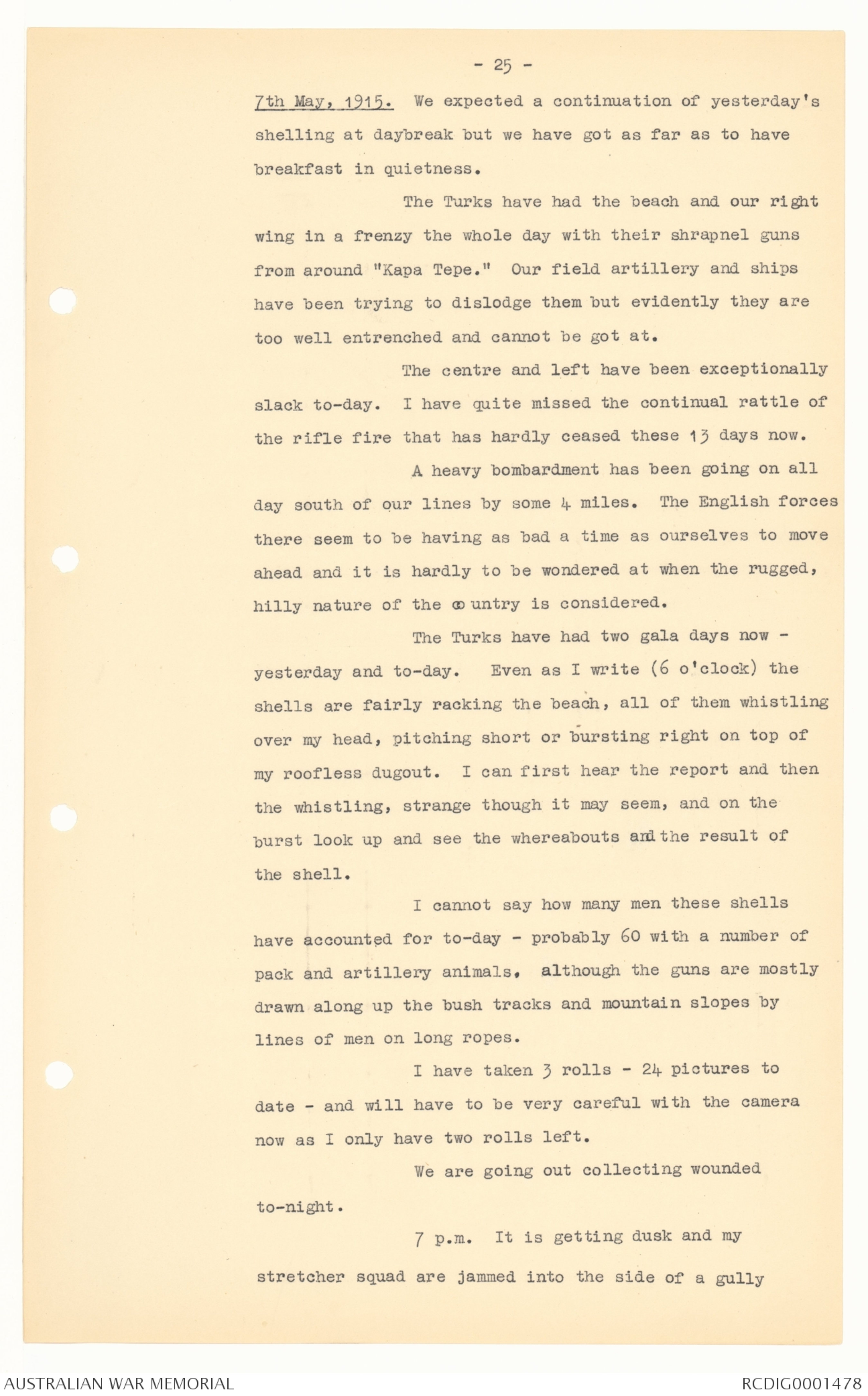
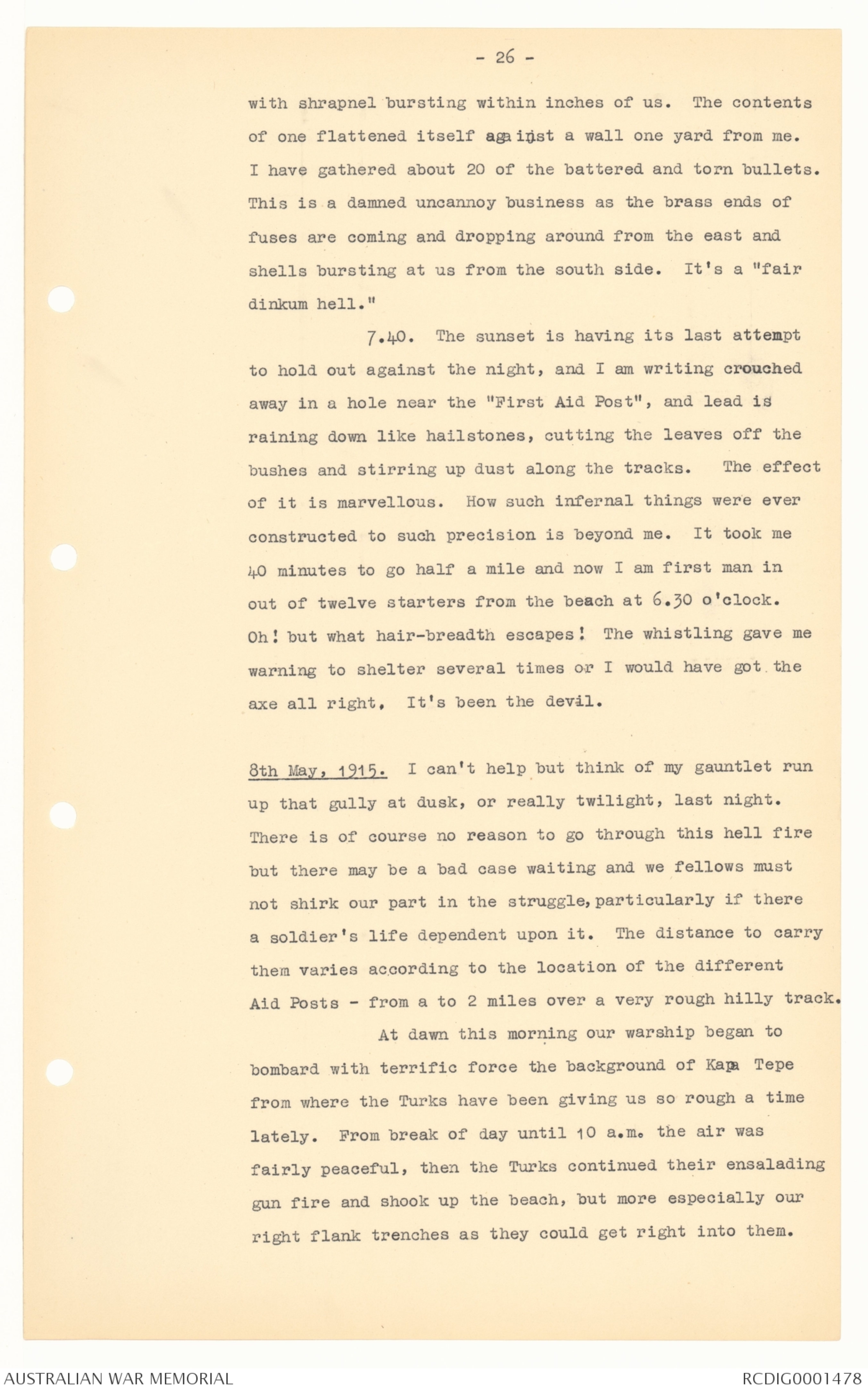
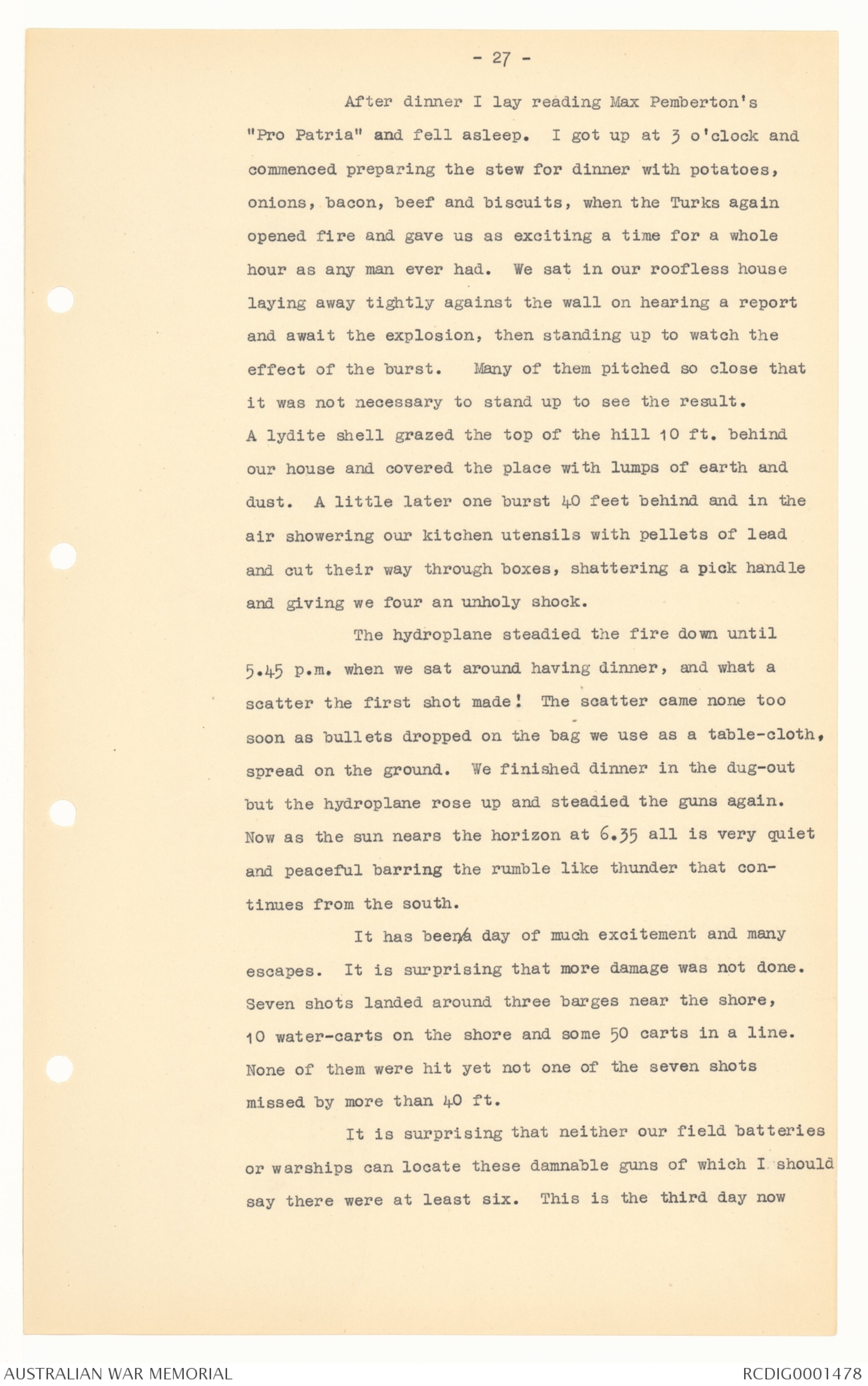
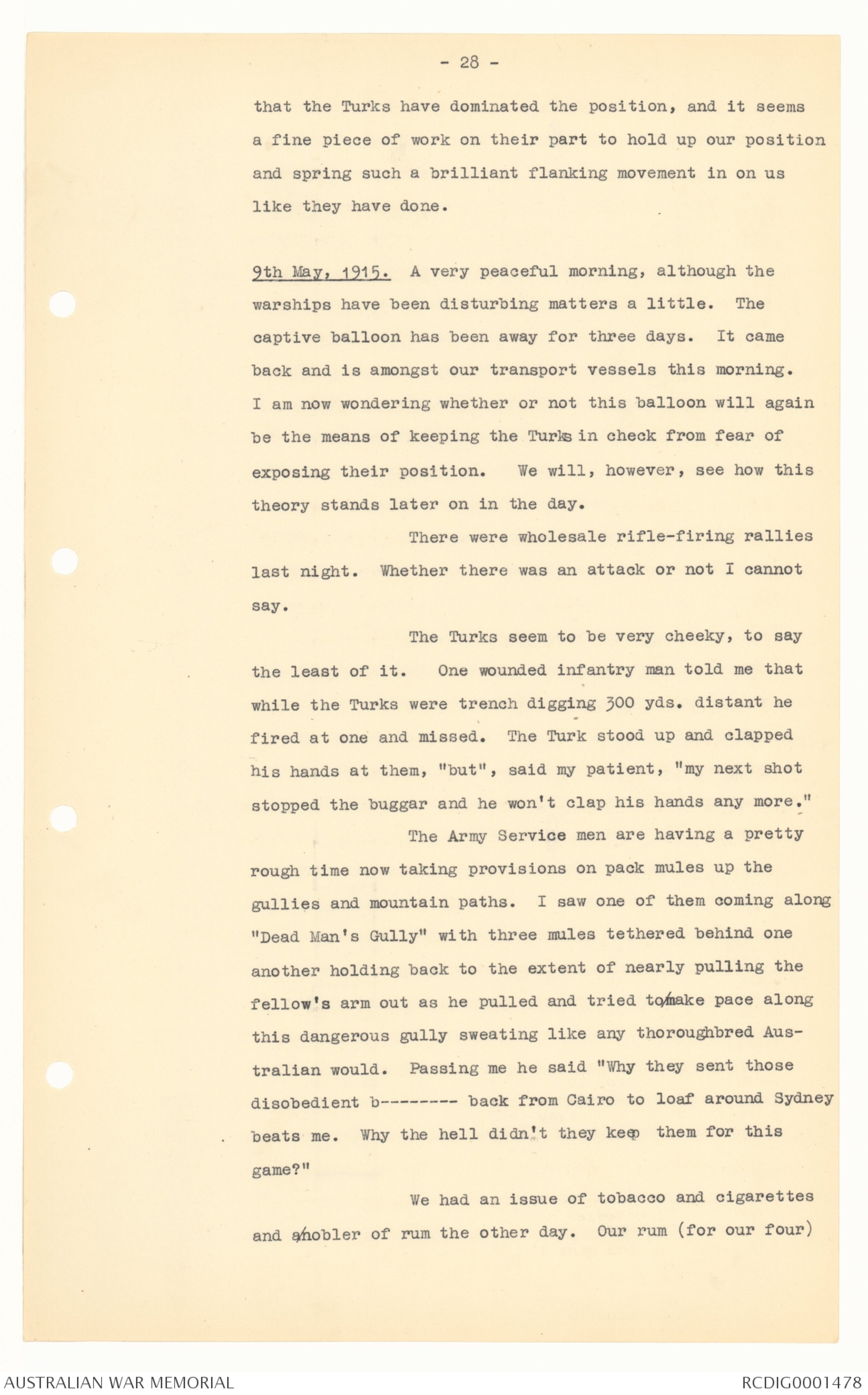
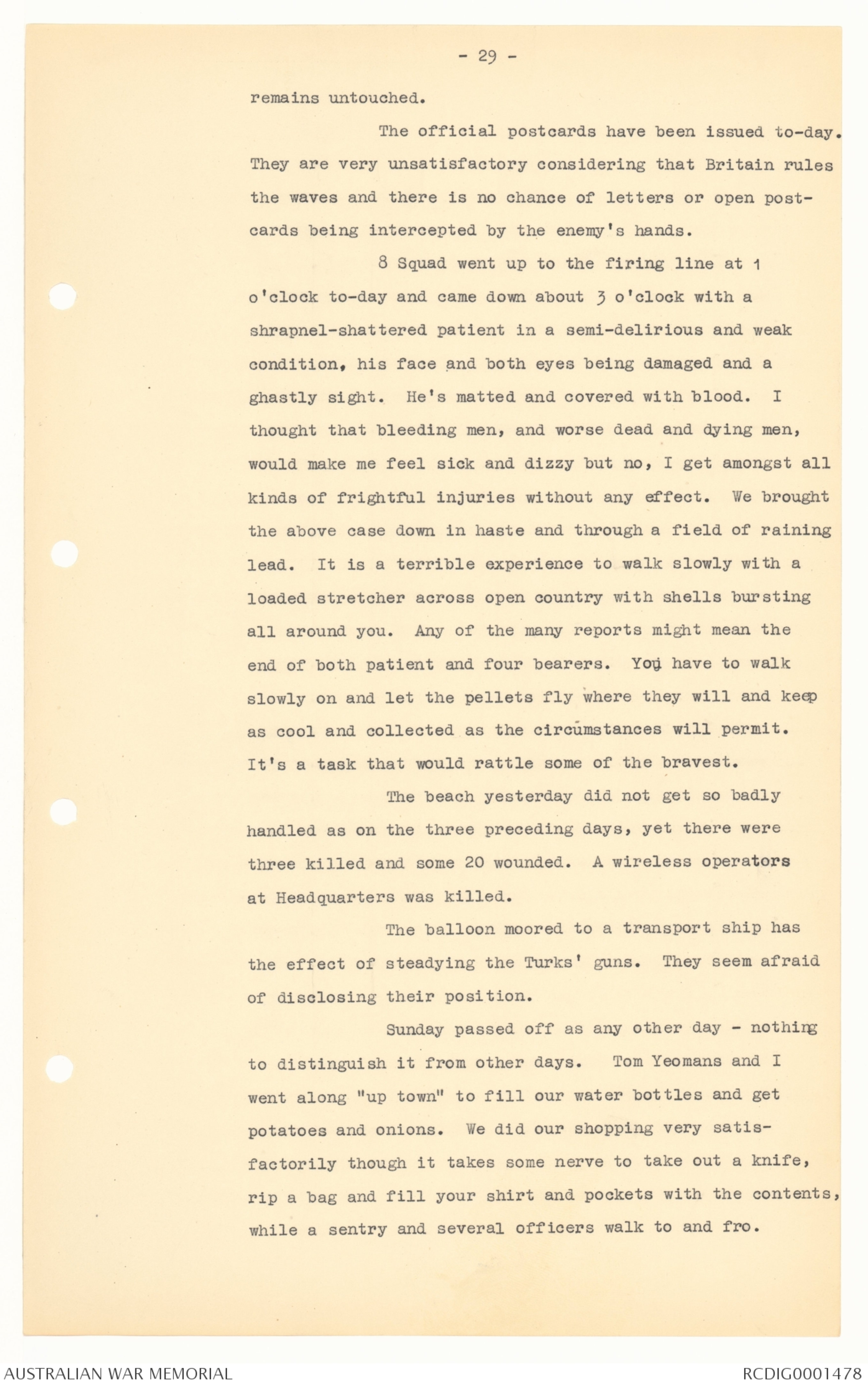
-20 -
Since early this morning to-day has been the
quietest to date. Rifle fire goes on more or less without
a stop but there was only one rally and that took place
after dark so there is, I am glad to say, no work for the
Ambulance.
Our fellows take their injuries with remarkable
fortitude. The last patient I brought in was along the
muddy gully, now known as "Dead Man Gully" on account
of the men and animals that are killed there from shrapnel,
as anything that bursts on or over the firing line falls
along this deep gully. Well, this man was shot through
the lungs and I fear had but little time to live, but on
the way down he said several times "By God, that Turk
could shoot well. He got me a beauty, didn’t he?" "I
thought I had him right enough but he beat me easily."
"Ah, lads, how long is this job going to take to mend?"
I would like to get back on that damned Turk." "I feel
pretty bad and expect I'm done for." "But, strike me
dead, that Turk could shoot all right."
Our "A" Section should have gone out to-night
but as there was nothing doing my squad did not move away
from the camp.
5th May, 1915. A lovely morning. Breakfast on fried
bacon, toasted biscuits, cheese and jam. No shrapnel or
spent bullets in the air this morning and what a change
it is! After eight days of incessant whistling and whizzing
of lead through the air.
Yesterday a launch and boat with a Red Cross
flying went right under the Turks' guns on the beach to
the south and without interference buried the dead and
took away the wounded. We are lead to think worse of the
Turks than to allow this.
- 21-
7.30 p.m. There are some 4000 moving off fully
equipped and supplied with two days' rations. Many are
the conjectures as to their mission but we know absolutely
nothing.
There was a little bombardment this afternoon about
5 o'clock. It started with a Turkish gun opening out on
our punts and barges anchored at the temporary wharf,
but such a nice serviceable and quickly-constructed wharf -
sand bags and piles! Some fifteen precision shells were
fired and the big barges hit three times, though uninjured.
These shells came from the point on our right or southerly
flank. A warship was seen to move her position, a lydite
shell or two followed and the land ploughed up ashore.
Whether the Turkish gun was blown up or not 'tis hard to
say but we were not bothered any further by them. A few
hundred Victorian reinforcements were having their tea at
the bottom of our camping hill, having just come ashore,
when this bombardment started. The day had been very quiet
and this was their first experience under fire and they
ran like rabbits up the hill and into the bushes.
6th May, 1915. "A" Section's on day work to-day. The
first call our No. 8 Squad got was a shattered arm which
was later amputated. This fellow - Robertson of the 12th
Battalion - was one of the most optimistic men possible.
There were five of them in a trench when a Turkish shell
broke away the side of the trench and mixed them all up
together. Some were blinded by the dirt, peppered by
the gravel and their clothes were badly shattered and torn
away from them. When the smoke and dust had died away
Robertson was the only man who could not rise from the
debris, his body being partly buried. When we got him
he was in the best of humour and seemed satisfied with the
feeling that the Turks will get hell when the boys get
fairly at them. He consoled himself with the fact that
-22 -
it might have been a lot worse and it was a good job none
of the other fellows were badly injured. He was indeed a
splendid character; small in size but one of the real
"Bull Dog Breed." I am thankful that Australia can produce
them as well as England.
Our next case was shot through the body and
died before we were 100 yards on our journey. We placed
the remains on the hillside and went back for a fellow
with a shrapnelled leg.- an easy injury. One of the 8th
Battery fellows with a shrapnel wound in the back came
along too. He walked all bent and doubled up, but what
a lovely long, lean, raw-boned Australian he was too.
The Turks had a gun mounted down off our right flank -
"Kapa Tepe" - and were pouring shells into our trenches
and amongst our three 18-pounders. It appears that our
chaps could not get at them without taking great risks
and exposing themselves. This they decided to do and
though five of the gun party were wounded, they got the
Turks' gun into the air, and though this lad was cut
across the back he was as happy as a schoolboy and quite
jubilant over his gun's success. He said it was worth
living a lifetime to get that Turkish gun after the
damage it had done during the last five hours.
This gun has done some damage this morning
right enough. Dozens of men both in and behind the
trenches were knocked about, and nothing unnerves
infantry men like shrapnel fire to which they cannot
respond. We Ambulance fellows also had some touchy work
to do. One shell burst around us. Four of the five
were hit in easy places - one chap right through his
hat leaving four holes in it. The beach in front of our
camp got it this morning from the same gun and accounted
for some 20 horses and mules and a fair number of men.
-23-
This is the first time the Turks have succeeded in
getting a gun around here. Fellows from the Artillery
say they brought them up in an ambulance waggon yesterday
afternoon. They saw it but allowed it to pass, and very
soon afterwards came the bitter shelling of our right
flank and the beach.
This morning a Turkish officer came riding
along the beach holding a white handkerchief over his
head. He is credited with saying his men were short of
food and tired of war. He personally was full up of being
bullied by German officers and had deserted.
It is now dusk. The above notes were entered
about 1 o'clock while waiting for Yeomans to get the
stew ready - potatoes, onions, thyme, tinned beef and
hard biscuits, also a little bacon - a delightful stew.
We had no sooner sat down to enjoy this stew to be followed
by cheese, jam and hard oatmeal biscuits, when shrapnel
began to fly around. The very first one broke back 20
ft. from us and directly overhead. The pellets passed
by us and landed fair amongst a party of fellows having
dinner 20 ft. away. One was seriously shot through the
abdomen, one had his hand badly damaged, and another his
arm smashed about./ I took two of them into our doctors
but the shells came along more thickly so I got the
Macconochie ration tin with my stew in it, three biscuits,
some jam and a mug of tea and screwed myself into H.
Miller's "dug-out", and between eating, watching and
ducking from fiercely-bursting shells I had about as
exciting a time as ever I want to have. Shrapnel racked
the hills and beach as far as I could see for quite 1½
hours, shells even bursting in the sleeping dugouts of
the 3rd Field Ambulance adjoining us. Fortunately not
many of them were at home, though after each explosion
the men came running out in strings. Shells burst
-24 -
amongst the provision stores, rows of two-wheeled mountain
carts and the Indian mule ranks. Most of the mules were
saved by the Indians dashing into the lines and racing the
animals away up a gully. Crouched away into a corner as I
was made me feel just like a hunted rabbit, but having
finished my stew I noticed that a report (strange and contrary
though it may seem) could always be heard first,
then the whistling of the shell, later the explosion
(mostly 60 ft. overhead) and then the swishing of the
shrapnel among the bushes and along the ground. The
shrapnel looked pretty as I got used to the warning sounds
and could watch it spread along the dusty flat in front of
me. The bullets would hit a line 100 ft. long and 10
ft. wide when breaking at 100 ft. in the air which appeared
to be a wee bit too high for the most efficient execution.
When they burst low down the contents of the shell lashed
into the ground with merciless strength.
This mighty and cruel, though interesting
exhibition, stopped about 4.30 p.m. and it was a wonderfully
animated scene to watch all the neighborhood out
digging their bedrooms down deeply into mother earth and
otherwise becoming prepared for a repetition of this
afternoon's onslaught.
My squad got busy with pick and shovel and
now we have a good balcony room dug back into the hill
where we will be able to view the bombardment with
reasonable safety. There is our kitchen and diningroom.
Our sleeping apartment is lower down. It is not dug in
more than one foot with bushes at the top and bottom to
keep the sun off as it burns during the day and is very
cold at night.
A day of much excitement and many experiences
-25-
7th May, 1915. We expected a continuation of yesterday's
shelling at daybreak but we have got as far as to have
breakfast in quietness.
The Turks have had the beach and our right
wing in a frenzy the whole day with their shrapnel guns
from around "Kapa Tepe." Our field artillery and ships
have been trying to dislodge them but evidently they are
too well entrenched and cannot be got at.
The centre and left have been exceptionally
slack to-day. I have quite missed the continual rattle of
the rifle fire that has hardly ceased these 13 days now.
A heavy bombardment has been going on all
day south of our lines by some 4 miles. The English forces
there seem to be having as bad a time as ourselves to move
ahead and it is hardly to be wondered at when the rugged,
hilly nature of the country is considered.
The Turks have had two gala days now -
yesterday and to-day. Even as I write (6 o'clock) the
shells are fairly racking the beach, all of them whistling
over my head, pitching short or bursting right on top of
my roofless dugout. I can first hear the report and then
the whistling, strange though it may seem, and on the
burst look up and see the whereabouts and the result of
the shell.
I cannot say how many men these shells
have accounted for to-day - probably 60 with a number of
pack and artillery animals, although the guns are mostly
drawn along up the bush tracks and mountain slopes by
lines of men on long ropes.
I have taken 3 rolls - 24 pictures to
date - and will have to be very careful with the camera
now as I only have two rolls left.
We are going out collecting wounded
to-night.
7 p.m. It is getting dusk and my
stretcher squad are jammed into the side of a gully
-26-
with shrapnel bursting within inches of us. The contents
of one flattened itself against a wall one yard from me.
I have gathered about 20 of the battered and torn bullets.
This is a damned uncannoy business as the brass ends of
fuses are coming and dropping around from the east and
shells bursting at us from the south side. It's a "fair
dinkum hell."
7.40. The sunset is having its last attempt
to hold out against the night, and I am writing crouched
away in a hole near the "First Aid Post", and lead is
raining down like hailstones, cutting the leaves off the
bushes and stirring up dust along the tracks. The effect
of it is marvellous. How such infernal things were ever
constructed to such precision is beyond me. It took me
40 minutes to go half a mile and now I am first man in
out of twelve starters from the beach at 6.30 o'clock.
Oh! but what hair-breadth escapes! The whistling gave me
warning to shelter several times or I would have got the
axe all right. It's been the devil.
8th May, 1915. I can't help but think of my gauntlet run
up that gully at dusk, or really twilight, last night.
There is of course no reason to go through this hell fire
but there may be a bad case waiting and we fellows must
not shirk our part in the struggle, particularly if there
a soldier's life dependent upon it. The distance to carry
them varies according to the location of the different
Aid Posts - from a to 2 miles over a very rough hilly track.
At dawn this morning our warship began to
bombard with terrific force the background of Kapa Tepe
from where the Turks have been giving us so rough a time
lately. From break of day until 10 a.m. the air was
fairly peaceful, then the Turks continued their ensalading
gun fire and shook up the beach, but more especially our
right flank trenches as they could get right into them.
-27-
After dinner I lay reading Max Pemberton's
"Pro Patria" and fell asleep. I got up at 3 o'clock and
commenced preparing the stew for dinner with potatoes,
onions, bacon, beef and biscuits, when the Turks again
opened fire and gave us as exciting a time for a whole
hour as any man ever had. We sat in our roofless house
laying away tightly against the wall on hearing a report
and await the explosion, then standing up to watch the
effect of the burst. Many of them pitched so close that
it was not necessary to stand up to see the result.
A lydite shell grazed the top of the hill 10 ft. behind
our house and covered the place with lumps of earth and
dust. A little later one burst 40 feet behind and in the
air showering our kitchen utensils with pellets of lead
and cut their way through boxes, shattering a pick handle
and giving we four an unholy shock.
The hydroplane steadied the fire down until
5.45 p.m. when we sat around having dinner, and what a
scatter the first shot made! The scatter came none too
soon as bullets dropped on the bag we use as a table-cloth,
spread on the ground. We finished dinner in the dug-out
but the hydroplane rose up and steadied the guns again.
Now as the sun nears the horizon at 6.35 all is very quiet
and peaceful barring the rumble like thunder that continues
from the south.
It has been a day of much excitement and many
escapes. It is surprising that more damage was not done.
Seven shots landed around three barges near the shore,
10 water-carts on the shore and some 50 carts in a line.
None of them were hit yet not one of the seven shots
missed by more than 40 ft.
It is surprising that neither our field batteries
or warships can locate these damnable guns of which I should
say there were at least six. This is the third day now
-28-
that the Turks have dominated the position, and it seems
a fine piece of work on their part to hold up our position
and spring such a brilliant flanking movement in on us
like they have done.
9th May, 1915. A very peaceful morning, although the
warships have been disturbing matters a little. The
captive balloon has been away for three days. It came
back and is amongst our transport vessels this morning.
I am now wondering whether or not this balloon will again
be the means of keeping the Turks in check from fear of
exposing their position. We will, however, see how this
theory stands later on in the day.
There were wholesale rifle-firing rallies
last night. Whether there was an attack or not I cannot
say.
The Turks seem to be very cheeky, to say
the least of it. One wounded infantry man told me that
while the Turks were trench digging 300 yds. distant he
fired at one and missed. The Turk stood up and clapped
his hands at them, "but", said my patient, "my next shot
stopped the buggar and he won't clap his hands any more."
The Army Service men are having a pretty
rough time now taking provisions on pack mules up the
gullies and mountain paths. I saw one of them coming along
"Dead Man's Gully" with three mules tethered behind one
another holding back to the extent of nearly pulling the
fellow's arm out as he pulled and tried to make pace along
this dangerous gully sweating like any thoroughbred Australian
would. Passing me he said "Why they sent those
disobedient b------- back from Cairo to loaf around Sydney
beats me. Why the hell didn't they keep them for this
game?"
We had an issue of tobacco and cigarettes
and a nobler of rum the other day. Our rum (for our four)
-29-
remains untouched.
The official postcards have been issued to-day.
They are very unsatisfactory considering that Britain rules
the waves and there is no chance of letters or open postcards
being intercepted by the enemy's hands.
8 Squad went up to the firing line at 1
o'clock to-day and came down about 3 o'clock with a
shrapnel-shattered patient in a semi-delirious and weak
condition, his face and both eyes being damaged and a
ghastly sight. He's matted and covered with blood. I
thought that bleeding men, and worse dead and dying men,
would make me feel sick and dizzy but no, I get amongst all
kinds of frightful injuries without any effect. We brought
the above case down in haste and through a field of raining
lead. It is a terrible experience to walk slowly with a
loaded stretcher across open country with shells bursting
all around you. Any of the many reports might mean the
end of both patient and four bearers. You have to walk
slowly on and let the pellets fly where they will and keep
as cool and collected as the circumstances will permit.
It's a task that would rattle some of the bravest.
The beach yesterday did not get so badly
handled as on the three preceding days, yet there were
three killed and some 20 wounded. A wireless operators
at Headquarters was killed.
The balloon moored to a transport ship has
the effect of steadying the Turks' guns. They seem afraid
of disclosing their position.
Sunday passed off as any other day - nothing
to distinguish it from other days. Tom Yeomans and I
went along "up town" to fill our water bottles and get
potatoes and onions. We did our shopping very satisfactorily
though it takes some nerve to take out a knife,
rip a bag and fill your shirt and pockets with the contents,
while a sentry and several officers walk to and fro.
 Sandy Mudie
Sandy MudieThis transcription item is now locked to you for editing. To release the lock either Save your changes or Cancel.
This lock will be automatically released after 60 minutes of inactivity.